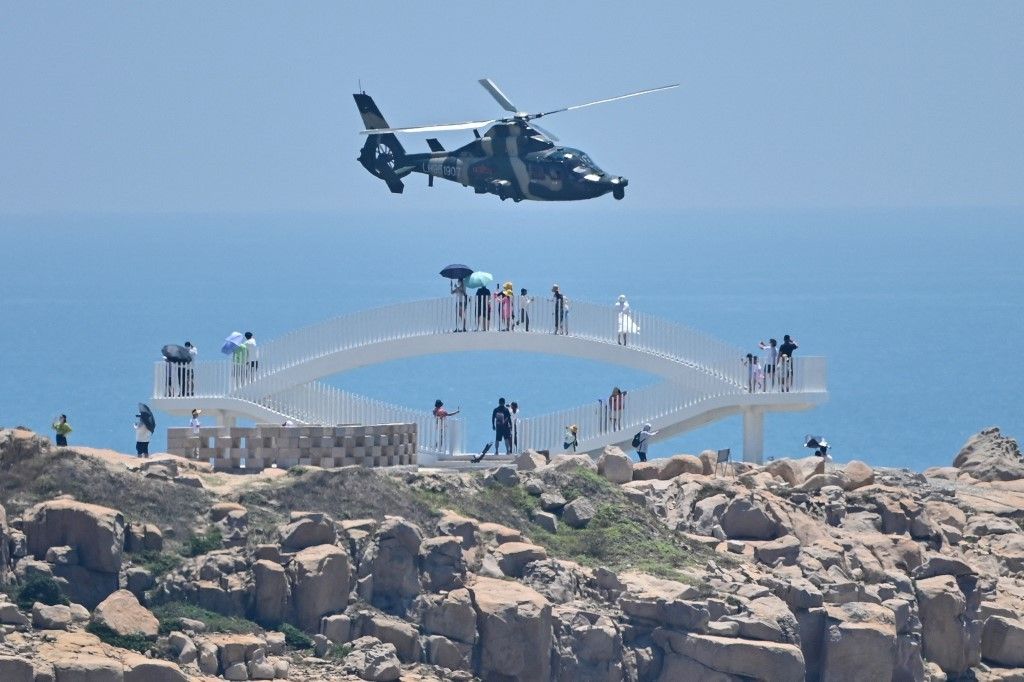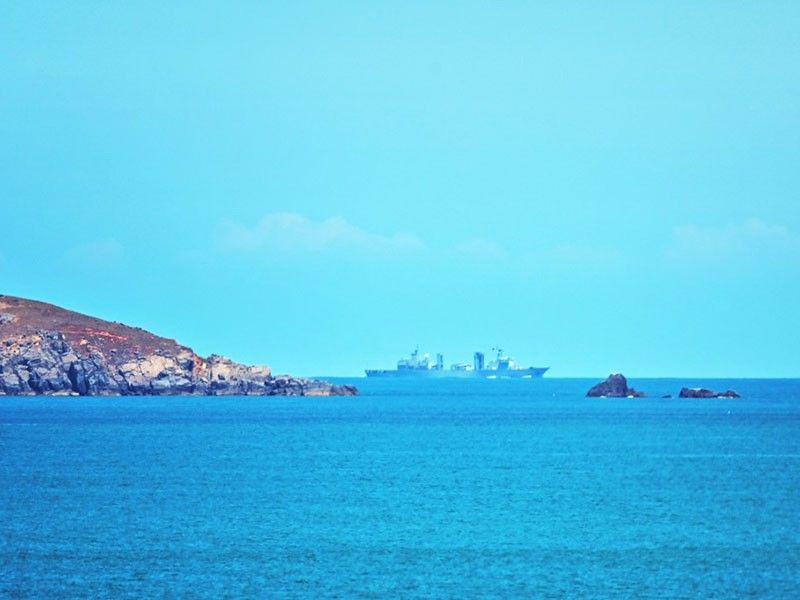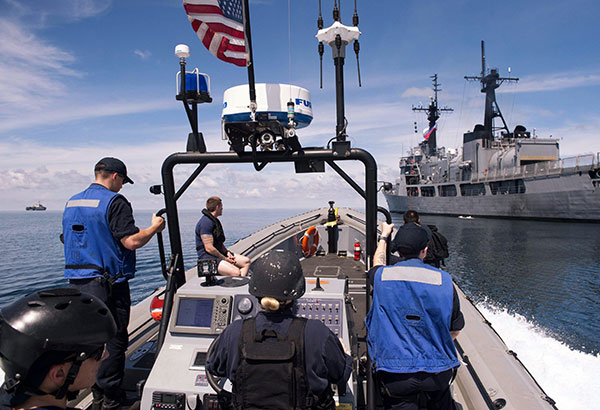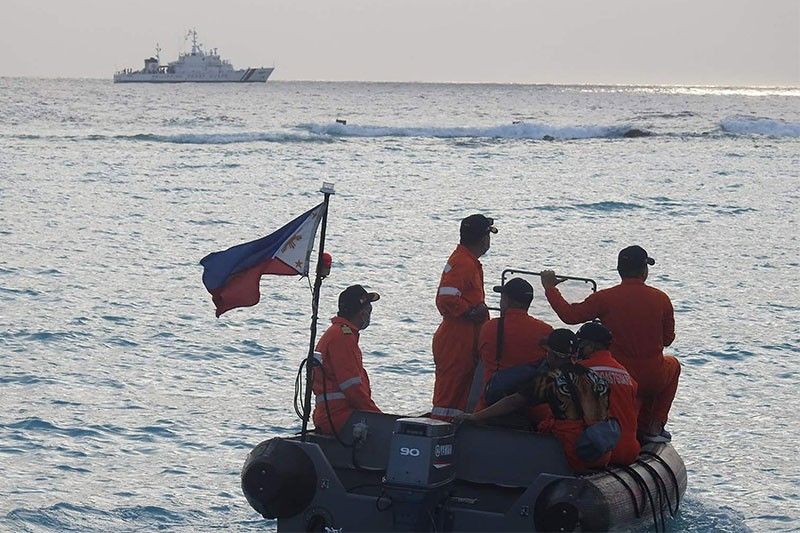What the Philippines can learn from China's reaction to Pelosi's Taiwan visit

MANILA, Philippines — After seeing how China reacted to visits to Taiwan by US officials over the past weeks, analysts point out that the Philippines should prepare to build its capacity and form strategic alliances to defend its territories.
Professor Herman Kraft, political science department chair at the University of the Philippines, noted that China’s playbook "is based on gray zones and short-term gains that [change] conditions on the ground in preparation for the next short-term objective."
"Our lesson here should be to be more active [in] matching the Chinese presence, and asserting our own positions," Kraft said.
"Ceding ground to China by claiming that we are not capable of winning a war against them falls into the trap of looking at the issue from the Chinese perspective."
RELATED: Marcos Jr. says to 'increase scope' of ties with China beyond sea dispute
Beijing conducted its biggest-ever military exercises around Taiwan after US House Speaker Nancy Pelosi visited the self-governing island earlier this month. China had warned that her visit "seriously harms" its territorial integrity and said there would be consequences for Washington.

A Chinese military vessel sails off Pingtan island, one of mainland China's closest point from Taiwan, in Fujian province on August 5, 2022. Taiwan blasted its "evil neighbour next door" on August 5 after China encircled the island with a series of huge military drills that were condemned by the United States and other Western allies. Hector RETAMAL / AFP
Pelosi was the highest-ranked elected US official to visit Taiwan in over two decades as Washington recently has been trying to build a strategic partnership with the democratic island.
Both the United States and the Philippines maintain a "One China" policy, which recognizes only one Chinese government. However, Beijing said Pelosi's recent visit sends a wrong signal to separatist forces.
Stratbase-ADR Institute president Victor Andres Manhit said Manila could learn from how China "will continue their aggressive behavior on what they define as their territory."
"Their playbook is based on the idea of projecting strength without firing bullets so that means they will always project that they can bully you and we need to accept that as the game that China is playing in the region," Manhit said.
Affecting regional security
A third US delegation landed in Taiwan on Sunday led by Indiana Gov. Eric Holcomb to pursue trade discussions with Taipei even after China conducted its military drills in the areas surrounding it.
China sees Taiwan as part of its territory and has vowed that it would reclaim it one day. Any diplomatic action that would give legitimacy to Taiwan would raise tension with Beijing.
READ: China envoy: Import ban, stalled talks legitimate response to Pelosi Taiwan visit
As the Philippines is located just south of Taiwan, analysts point out that any form of aggressiveness from China could spill over to Manila — for example, through the Scarborough Shoal (Panatag) that is part of the West Philippine Sea.
This would then open up more cans of worms as both Beijing and Manila have claims over the waters, which a 2016 arbitral tribunal said was a traditional fishing ground that claimants cannot bar fishers from other countries from going to.
China continues to ignore the Hague ruling that invalidated its nine-dash claims over parts of the South China Sea and instead provided that it is part of the Philippines’ exclusive economic zone and continental shelf.
READ: How the Hague court ruled on the Philippines’s 15 arguments

This July 2017 file photo shows US sailors assigned to littoral combat ship USS Coronado ride a rigid-hull inflatable boat to the BRP Ramon Alcaraz for personnel transfer during a coordinated counter-piracy operation in the Sulu Sea. US NAVY PHOTO/ DEVEN LEIGH ELLIS
The effect of pressure that China is putting on Taiwan goes beyond the region, Manhit said. "It also affects Northern East Asia countries who [have] concerns with China, especially the East China Sea with Japan. This is what we should be looking at, how it affects the East Asia security and peace situation."
Like in the West Philippine Sea and South China Sea, there are also disputes over the East China Sea between China and Japan as the two countries along with South Korea and Taiwan share the waters.
The Philippines has called on both the US and China “to ensure continuing communication” to keep tensions from further escalating.
And as the situation continues to unfold, the Department of Migrant Workers has instructed the Philippines’ three labor attaches in Taiwan to stay vigilant and make themselves visible to the over 150,000 overseas Filipino workers there.
Amador Research Services Founder and CEO Julio Amador pointed out that the country’s contingency plans should also go beyond OFWs and "look at how any potential conflict will affect our economy and our security."
"Are we ready to accept refugees from Taiwan? Can we be a potential relocation hub for Taiwanese corporations?," Amador pointed out.
What else can the Philippines do?
Meanwhile, Kraft said the situation could make the Philippines take a "more nuanced approach" to an independent foreign policy as takes into consideration both the US and China.
He added that the Philippines should "work diplomatically" with partners and at the same time, "exploit the alliance with the US in terms of developing our security capabilities."
Manila and Washington have a Mutual Defense Treaty (MDT), which means that any attack on either country’s military forces could trigger a mutual defense response from the other. Foreign Affairs Secretary Enrique Manalo earlier said that joint patrols in the West Philippine Sea with the United States — engagement that the Duterte administration shunned — may be "continued to be explored bilaterally" as this is also provided in the MDT.
READ: Philippines welcomes possible WPS joint patrols with US
Meanwhile, Manhit points out that investments in the Philippine Navy and the Philippine Coast Guard are also needed to secure the country's territorial claims against the constant threat from China.

In this undated handout photo received from the Philippine Coast Guard (PCG) on April 25, 2021, coast guard personnel conduct maritime exercise near Pag-asa island in the West Philippine Sea. AFP / Philippine Coast Guard, Released/ AFP
He also said that it's time to consider checking the Enhanced Defense Cooperation Agreement as the country also needs to project a strategic initiative.
He also emphasized that there are also countries such as Australia, Japan, the United Kingdom, and some members of the European Union that have offered to conduct joint patrols with Philippine vessels.
READ: 'Stronger military, alliances needed to complement talks on West Philippine Sea'
"We know for a fact there’s no quick solution to our weak capacity to defend ourselves but the quickest way is how to build partnerships and alliances that have offered us help," he said. — with reports from Agence France-Presse
- Latest
- Trending


































